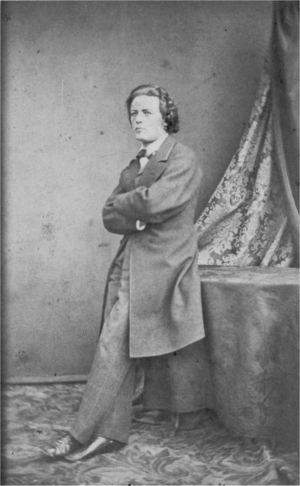Anton Rubinstein Cello Concerto No. 1 (1864)
Performed by Werner Thomas. Conducted by Yuri Ahronovitch with the Bamberg Symphony Orchestra.
I. Moderato Con Moto - 00:00
II. Adagio - 12:07
III. Allegro Con Fuoco - 22:11
| Anton Grigorevich Rubinstein (), ( November 28, 1829 – November 20, 1894) was a Russian pianist, composer and conductor. As a pianist he was regarded as a rival of Franz Liszt, and he ranks amongst the great keyboard virtuosos. He also founded the St. Petersburg Conservatory, which, together with Moscow Conservatory founded by his brother Nikolai Rubinstein, helped establish a reputation for musical skill among the subjects of the czar of Russia. (Photo credit: Wikipedia) |
As a pianist, Rubinstein ranks amongst the great 19th-century keyboard virtuosos. He became most famous for his series of historical recitals—seven enormous, consecutive concerts covering the history of piano music. Rubinstein played this series throughout Russia and Eastern Europe and in the United States when he toured there.
Although best remembered as a pianist and educator (most notably in the latter as the composition teacher of Pyotr Ilyich Tchaikovsky), Rubinstein was also a prolific composer throughout much of his life. He wrote 20 operas, the best known of which is The Demon. He also composed a large number of other works, including five piano concertos, six symphonies and a large number of solo piano works along with a substantial output of works for chamber ensemble. Rubinstein chose to write in an early-Romantic Germanic style and did not exploit the native characteristics of Russian music in his work.
Sometimes Rubinstein's playing was too much for listeners to handle. American pianist Amy Fay, who wrote extensively on the European classical music scene, admitted that while Rubinstein "has a gigantic spirit in him, and is extremely poetic and original ... for an entire evening he is too much. Give me Rubinstein for a few pieces, but Tausig for a whole evening." She heard Rubinstein play "a terrific piece by Schubert," reportedly the Wanderer Fantasie. The performance gave her such a violent headache that the rest of the recital was ruined for her.
Clara Schumann proved especially vehement. After she heard him play the Mendelssohn C minor Trio in 1857, she wrote that "he so rattled it off that I did not know how to control myself ... and often he so annihilated fiddle and cello that I ... could hear nothing of them." Nor had things improved in Clara's view a few years later, when Rubinstein gave a concert in Breslau. She noted in her diary, "I was furious, for he no longer plays. Either there is a perfectly wild noise or else a whisper with the soft pedal down. And a would-be cultured audience puts up with a performance like that!
Many of Rubinstein's contemporaries felt he bore a striking resemblance to Ludwig van Beethoven. Ignaz Moscheles, who had known Beethoven intimately, wrote, "Rubinstein's features and short, irrepressible hair remind me of Beethoven." Liszt referred to Rubinstein as "Van II." This resemblance was also felt to be in Rubinstein's keyboard playing. Under his hands, it was said, the piano erupted volcanically. Audience members wrote of going home limp after one of his recitals, knowing they had witnessed a force of nature.











